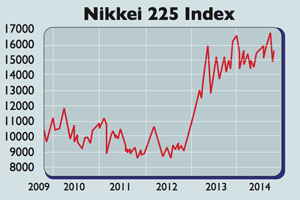Japan hits a speed bump
Japan's rampant stockmarket growth has slowed to a crawl this year.

Get the latest financial news, insights and expert analysis from our award-winning MoneyWeek team, to help you understand what really matters when it comes to your finances.
You are now subscribed
Your newsletter sign-up was successful
Want to add more newsletters?

Twice daily
MoneyWeek
Get the latest financial news, insights and expert analysis from our award-winning MoneyWeek team, to help you understand what really matters when it comes to your finances.

Four times a week
Look After My Bills
Sign up to our free money-saving newsletter, filled with the latest news and expert advice to help you find the best tips and deals for managing your bills. Start saving today!
"The excitement Japan's fresh start once aroused has long since ebbed," says the FT. The Nikkei took off like a rocket in 2012 when Abenomics', the government's attempt to end years of stagnation and deflation, was launched.But it has been treading water for much of this year.
Prime Minister Shinzo Abe decided to raise the consumption tax, the equivalent of VAT, in April in order to boost government revenue and help cut borrowing. The move restored some fiscal credibility: the budget deficit has declined to a five-year low of 6% of GDP.
But weak data in recent weeks fuelled fears that it has also snuffed out the economic recovery. There is now talk of postponing a further tax hike, which had been planned for next year.
MoneyWeek
Subscribe to MoneyWeek today and get your first six magazine issues absolutely FREE

Sign up to Money Morning
Don't miss the latest investment and personal finances news, market analysis, plus money-saving tips with our free twice-daily newsletter
Don't miss the latest investment and personal finances news, market analysis, plus money-saving tips with our free twice-daily newsletter
However, it's too soon to write off the rebound. Industrial production has been sliding since February, but the economy should by now have adjusted to the slump in sales triggered by the tax increase,says Capital Economics.
Firms are reporting little spare capacity, which bodes well for higher capital expenditure. And retail sales have ticked up, suggesting that consumption is recovering. Japan should also benefit from falling oil prices, as petroleum products comprise a fifth of its imports.
Nonetheless, the Bank of Japan seems likely to increase the pace of its quantitative-easing programme, as inflation looks to be weakening again. Looser monetary policy bodes well for equities, and also implies further weakness in the yen.

What's more, some of Abe's biggest reforms are coming to fruition, addsPeter Thal Larsen on Breakingviews. One of the most investor-friendly is a shift in the holdings of the Government Pension Investment Fund towards riskier assets. It plans to raise its allocation of domestic stocks to about 25%, from 12% today. Labour market liberalisation is on the agenda, but will take time.
Meanwhile, Japanese firms are under pressure to raise dividend payouts, given their relatively strong balance sheets. And they are also still reasonably priced, with many trading below book value. All told, the latest setbacks for Abenomics "are a speed bump, and not the end of the road".
Get the latest financial news, insights and expert analysis from our award-winning MoneyWeek team, to help you understand what really matters when it comes to your finances.

-
 Should you buy an active ETF?
Should you buy an active ETF?ETFs are often mischaracterised as passive products, but they can be a convenient way to add active management to your portfolio
-
 Power up your pension before 5 April – easy ways to save before the tax year end
Power up your pension before 5 April – easy ways to save before the tax year endWith the end of the tax year looming, pension savers currently have a window to review and maximise what’s going into their retirement funds – we look at how